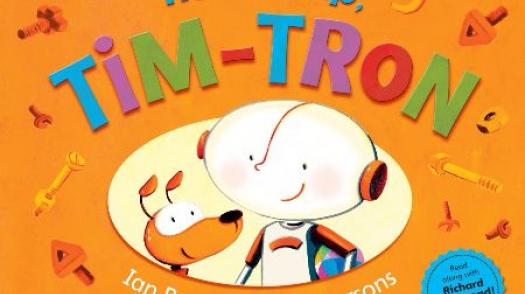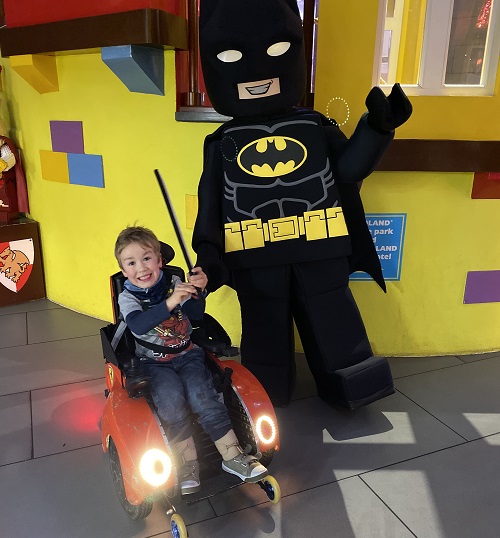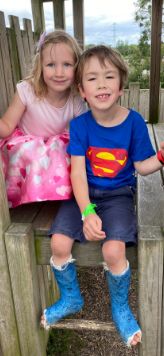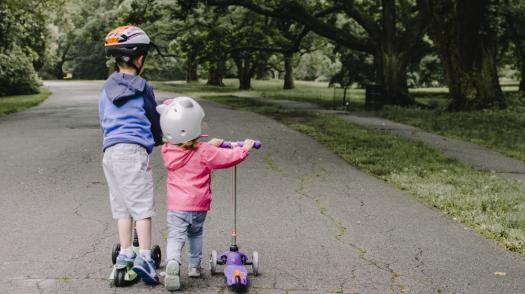
Books on brain injury
Our series of free books and resources aimed at children and families (P&P costs only).
Joanna’s six-year-old son, Sebby, has an undiagnosed disability. She tells us how surgery has made a difference to the pain Sebby experienced because of spasticity, and why she has launched a petition urging for fairer inclusion for disabled children.

Published August 2020
At 10 months old we became aware that Sebby wasn’t meeting milestones; he couldn’t sit or crawl, while other kids were toddling and crawling around him. We put it down to him being a large baby, but it became obvious something was wrong.
He was about 14 months when we knew that a disability was the explanation. It was painful to accept. I was pregnant with his sister and we were concerned the same thing may affect her, which thankfully it hasn't.
This acceptance started an emotional and complex medical journey, including MRIs, blood tests, lumber puncture; xrays, participation in genetic studies, and surgery.
No reason for his disability has been found. Sebby has spasticity, which is a tightness in his body. For years we have searched for diagnosis, until we had exhausted all options. A diagnosis now wouldn't make a difference to his treatment.
As his spasticity is most commonly associated with cerebral palsy, we started following cerebral palsy physiotherapy and surgical options.
One of the most emotional aspects we've come across is difference of opinions on treatment. Many people think physio will suffice and are reluctant to operate, but we realised that while he had spasticity in his body, walking was never going to be an option.
We researched an operation called selective dorsal rhizotomy (SDR) and despite objections from UK doctors, we took Sebby to the USA when he was four for a spinal operation to remove his spasticity, and a further operation to lengthen his hamstrings and calves. We did this partly to help increase his mobility but also to reduce pain.
The effect of the operation was amazing. For the first time he could move without the invisible force restricting him. His muscles were weak so he’s had intensive physio. Spasticity caused damage to parts of his body. He has had a double hip operation where his hip was reshaped and femurs were cut and re-angled. He’s also had surgery on his toenails, and bones in his feet were fused to stop his feet rolling inwards.

Sebby’s condition affects every part of his life, both physically mentally.
It has forced him and his sister, Lottie to grow up quickly. In addition to school, he has physio, swimming sessions, strength training, hippotherapy, race running (which is running using a frame), wheelchair tennis and football using a frame – all to build his strength up.
He spends most school holidays doing therapy sessions. We're so grateful there are people doing sports for disabled kids, as he's having fun.
He longs for things other kids take for granted, like walking with his sister and friends, carrying his dinner tray at school, and getting into a chair on his own.
Despite his frustrations of feeling different, he is a friendly, happy boy, who never stops chatting or telling jokes! He loves school, as he spends all day with his friends and finds learning interesting.
We're proud of him and Lottie for dealing with this different life and all the obstacles it throws.
We acknowledge that it’s hard and he's allowed to feel frustrated. But also encourage him to focus on all the positives, like he (and Lottie) get to go to our local university gym with a strength trainer, and no other six-year-olds get special permission to go in the gym. Or the attention he gets for his cool wheelchair, which one of his friends referred to as a rocket ship. It's a balance between recognising his mental health and acknowledging how he feels, but directing him to focus on the positives, and working hard on the things he can control.
After his most recent operation on his feet, all focus is on building Sebby’s strength back up. He is determined to walk more than anything. With this determination and focus, we are hopeful he will, whether it be with sticks or independently.
Sebby wants to be spy or a ninja when he's grown up, and treats his physio as the start of his training!
If he can have an independent life when he's older, without relying on people 24 hours a day to help, that would be a dream come true.
We are currently running a petition for changes to be made in leisure attractions. This is as a result of what happened to Sebby during a trip to a theme park.
Having notified the park in advance that he was disabled, and collected the disability pass on arrival, we were asked which ride he wanted to fast-track.
We used the lift to the disabled entrance of that ride, where staff informed us Sebby needed to leave his wheelchair and take three steps, holding onto one of our hands. We were told he could not go on the ride unless he could. Somehow, he managed the steps.
Once we lifted him into the ride someone came and said the people behind the glass window watching weren't satisfied and he needed to do it again since there were stairs on the evacuation route. He again took the extremely difficult steps, in front of the waiting queue. It was painfully obvious that the delay to their ride was due to this disability test.
At no point did anyone speak to Sebby, no acknowledgment or kind words. I feel it was especially wrong to do it in front of people rather than in private, and then give us a pass to say he'd met their unnecessary requirements.
We found out that around 80% of the rides are not accessible if you cannot take the three steps. We'd been to other venues and never been discriminated against in such a manner.
We want to stop what happened to Sebby happening to others.
Reasonable adjustments can be made to ensure inclusivity. In our case, the three steps of the ride could have been replaced with a small ramp.
The petition is being supported by our local MP, Siobhan Baillie and the more people that sign the petition, the stronger our voices are to encourage MPs in bringing legislation to increase inclusivity.

Our series of free books and resources aimed at children and families (P&P costs only).

Chloe sustained a brain injury at birth and was given a 50% chance of survival. She has cerebral palsy, epilepsy and other health conditions. Her mum, Joanne, shares their story.

Theme parks are becoming more inclusive. As part of our Summer Series, we’re looking at fun days out around the UK.